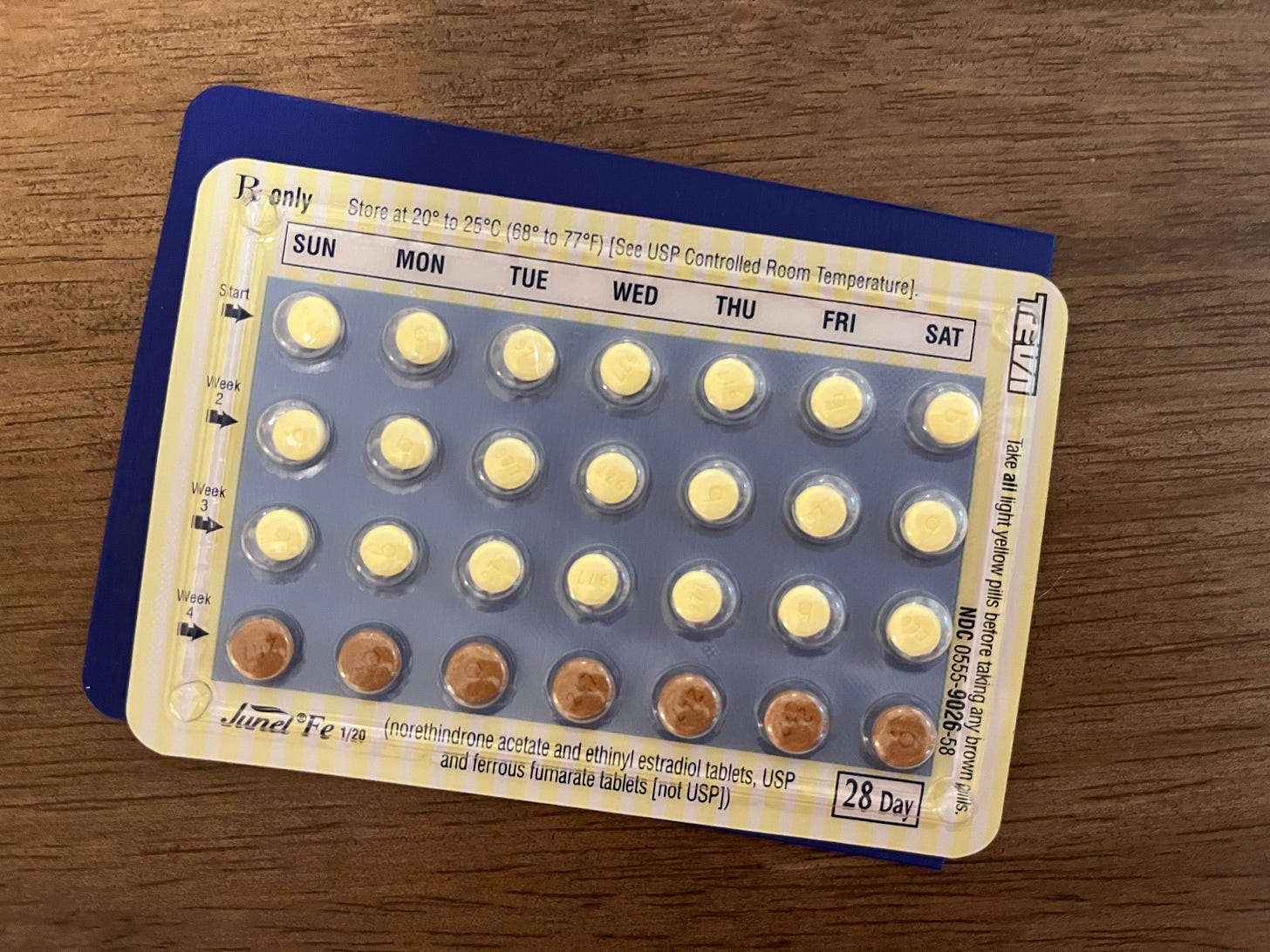Selected Inputs #002
What shaped my thoughts on getting back on birth control, the challenges with psych meds, and how the MAHA movement is impacting both
Welcome back to Selected Inputs, an annotated collection of most of the sources behind my monthly essays. I spent a lot of time with this material as I wrote, brainstormed, and rewrote my latest essay, “In and Out of Control.” Let’s start with some relevant numbers for this piece:
900,000: The number of women aged 15-49 currently taking the birth control pill
40 million: The number of adults in the United States who take some kind of psychiatric drug (a low estimate)
21.2%: Percentage of women who take medication for their mental health
11.5%: Percentage of men who take medication for their mental health
I could have spent months digging into this topic, and there were so many people I would’ve interviewed if this were a longer piece. But I’m hoping that experts and those with personal, lived experience alike join me here. Tell me your opinions, share your thoughts, ask hard questions! Let’s dig into it.
Reporting on birth control and culture that I took notes on while eating the banana bread in the Center for Fiction’s reading rooms…
Birth Control TikTok Is a Symptom of Medicine’s Bigger Problem by Sarah Sloat (2022): WIRED published this piece when the birth control social media craze really picked up (not coincidentally, in the aftermath of the Dobbs decision), and Sloat brings a voice of calm, thorough consideration to the problems with influencers in this space while validating why women turn to social media in the first place. It’s an excellent piece, but something I wanted to highlight in particular is a point she makes about birth control as a scapegoat. We don’t fully understand the mechanisms behind things like libido and mental health (hence, the questions with psych meds!), so it’s also very possible that hormonal birth control takes the blame for questions we just don’t have answers to yet. It goes back to the tension of treating root causes versus symptoms, and the reality that there are some things we actually don’t know the root causes of.
Women are getting off birth control amid misinformation explosion by Lauren Weber and Sabrina Malhi (2024): I cited this article frequently in my essay, but I want to reiterate a sobering perspective: that of a DC-area doctor who has seen an increase in patients coming in for abortions specifically after believing what they see online about the dangers of hormonal birth control and the efficacy of tracking periods for pregnancy prevention. Though this is anecdotal, it illustrates the stakes of these decisions in our post-Dobbs world. I also appreciated the point that medical mistrust is exacerbated in communities of color—forced sterilization programs were not that long ago, and make women of color particularly wary.
Note: As recently as 2010, California prisons were performing forced sterilizations on incarcerated women after they gave birth. That should be as horrifying as it sounds.
The Woman Who Got Your Best Friend Pregnant by Sara Harrison (2024): When I went off the pill a couple of years ago, I used the fertility awareness method (FAM), among other back-ups. FAM is a way of tracking your menstrual cycle to identify fertile and infertile periods, and there’s a huge range of information about how effective it is. It can be quite effective when used correctly and carefully, which takes a lot of time and information. This piece is a great profile on Toni Weschler, the public health advocate who popularized FAM with her seminal book, Taking Charge of Your Fertility, which has been co-opted by all shades of the political spectrum.
Favorite quote: “Like raw milk or off-the-grid living, Taking Charge of Your Fertility has ended up at the intersection of the Venn Diagram of the far left and the far right.”
Is Contraception Under Attack? by Margaret Talbot (2024): Talbot’s article is also heavily referenced in my essay, but I want to draw attention to a few things that didn’t make it into the final piece. One is that 2024 was the first year a birth control pill (Opill) became available over the counter, and that’s a huge deal! Another is an example of why I wanted to talk about strategies for making informed decisions at the end of the piece. In this article, Talbot cites research that hormonal birth control has been associated with a higher risk of breast and cervical cancers, but a lower risk of ovarian, endometrial, and colorectal cancers. Compare that to…
Beyond the Pill by Dr. Jolene Brighten (2019): A book by a naturopathic endocrinologist that only discusses the higher risks of breast and cervical cancers—without mentioning the research on lower risk of ovarian, endometrial, and colorectal. All writing is, in some way, persuasive and has a selectivity bias. Mine included. But that’s why it’s important to dig a little deeper into what that perspective is. If you only read Brighten’s book, you would learn a lot about women’s health and hormones that really isn’t well-known. But you’d also be missing key information (while being encouraged to buy a variety of supplement regimens).
Note: I don’t consider this book reporting, but I grouped it with the other pieces to demonstrate the importance of knowing your source.
Perspectives on psychiatric medication I read while listening to various Miyazaki film scores…
The Challenge of Going Off Psychiatric Drugs by
(2019): Aviv’s piece is primarily a profile of Laura Delano, with a lot of reporting about the state of psychiatric medication. It was something I really needed to read after my father’s death, and my own negative experience with lamotrigine—for me, it’s reassuring to know that there are challenges and uncertainties, rather than having a more straightforward understanding that turns out to be false. I’m sure I’m not alone in thinking that mental illness is caused by a chemical imbalance—a “useful metaphor” that’s an oversimplification and disregards genetic and environmental factors. I appreciated that Aviv made all these points. It’s a long, thought-provoking read.Leading a Movement Away from Psychiatric Medication by
(2025): The New Yorker profile on Delano was so memorable to me that it felt kismet when I started my research and found that her new book, Unshrunk, just came out in March (which I have yet to read). But this New York Times piece is an interesting follow-up to the 2019 profile, especially because Berry contextualizes Delano’s work within the MAHA movement. There’s healthy skepticism, along with noting that the psychiatric establishment is starting to recognize the need for better guidelines about deprescribing. This is a good place to point out the nuance that gets lost in a lot of the internet-driven, MAHA-inspired discourse—we want to paint broad strokes across individual differences. In this context, especially, we talk about “mental illness” as one colossus, when it encompasses so many illnesses and treatments. It can be true that there’s a large population with serious mental illness who needs medication, perhaps for a lifetime, while it is also true that there are many people who benefit from medication in the short term and then should come off it, and others still who don’t benefit from it at all.Harm From Antidepressants Is Real. Let’s Not Cede the Conversation to Kennedy by Dr.
(2025): A friend of mine who is a psychiatric nurse sent me this timely essay after I chatted with her about the piece I was working on, and I loved Dr. Aftab’s perspective. I want to emphasize a point he makes that didn’t make it into my essay: SSRIs were originally studied for short-term use and approved after clinical trials that were only a few months long, so there is uncertainty about the long-term effects, given that many patients actually stay on the drugs for years. More important context is that pharmaceutical companies are not going to fund research on whether psych meds lose effectiveness or cause harm over long-term use—it’s not in their interests. I appreciate the expertise combined with empathy for patients’ experience on display here. It was one of my favorite sources for framing the risk-benefit considerations that are at the heart of all these decisions, whether it’s an antidepressant or the birth control pill.Favorite quote: “The question is whether the medical establishment will meet that demand with humility and scientific transparency—or leave the conversation to those willing to exploit the suffering of vulnerable individuals for their personal and political gain.”
A final thought (for now)…
Impact on Women: Of course, the question of hormonal birth control is a women’s health conversation (famously, research into a male birth control pill was shut down after reports of side effects like mood swings and acne—but there has been promising progress toward non-hormonal male birth control since). I want to add that women are more likely than men to be treated, diagnosed with, and prescribed medication for mental illness. That could be an entire essay in itself, but it’s not a coincidence that these two categories of medication are under particular scrutiny in the MAHA culture. As important as it is to pay attention to sources of information, it’s just as important to pay attention to who is impacted by political and cultural shifts in conversation. With that, I’ll leave you with some (of many!) questions I’d love to hear from you about.
What are your thoughts on…
Where or whom do you go to when you’re making a decision about your health?
What do you know now about birth control and reproductive health that you wish you’d known earlier? What do you still want to know?
Have you ever had your physical or mental health concerns dismissed by a doctor? What about experiences where doctors have really seen you and your concerns?
What do you think about movements to decrease the use of hormonal birth control and psychiatric meds?
What makes you feel most in control of your health and well-being?
Dig into these and anything else on your mind in the comments 〰️









